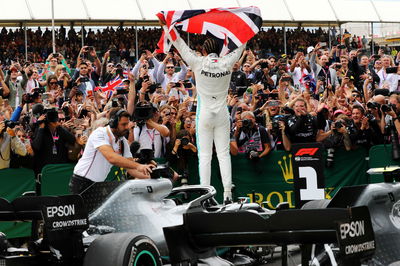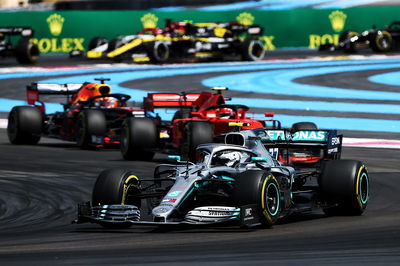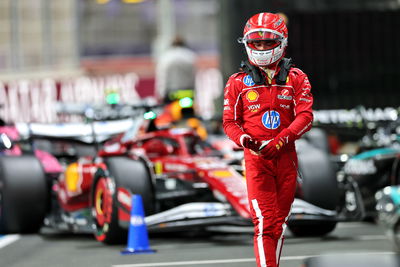Does F1 risk being shamed again by its optimism for 15-18 races?
Formula 1 has outlined an initial blueprint for a grand plan to get the 2020 season underway, but its proposal appears optimistic at best and a disastrous risk at worst.
On Monday, F1 revealed the first details of its ambition to start up the 2020 season following the delays caused by the ongoing coronavirus crisis.
It followed announcements that the British Grand Prix would be held behind closed doors if it all, and that the French Grand Prix had been cancelled altogether, becoming the 10th race to be affected by the COVID-19 pandemic.
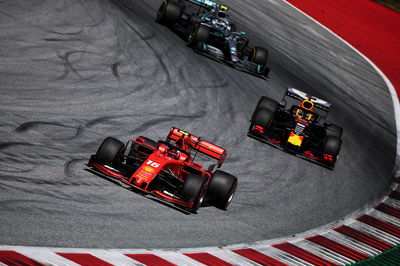
Formula 1 has outlined an initial blueprint for a grand plan to get the 2020 season underway, but its proposal appears optimistic at best and a disastrous risk at worst.
On Monday, F1 revealed the first details of its ambition to start up the 2020 season following the delays caused by the ongoing coronavirus crisis.
It followed announcements that the British Grand Prix would be held behind closed doors if it all, and that the French Grand Prix had been cancelled altogether, becoming the 10th race to be affected by the COVID-19 pandemic.
Despite the negative facts, F1 CEO Chase Carey insists he is “increasingly confident” that the season can get underway with the Austrian Grand Prix in early July. While not confirmed, a plan for two races to be held in Austria on July 5 and 12, followed by consecutive races at Silverstone on 19 and 26 July is understood to be in the works. All events would take place behind closed doors.
F1 remains unmoved in its objective of holding between 15-18 races this calendar year, which would result in a heavily-congested fixture list of racing occurring on most weekends between July and Christmas.
"September, October and November, would see us race in Eurasia, Asia and the Americas, finishing the season in the Gulf in December with Bahrain before the traditional finale in Abu Dhabi, having completed between 15-18 races,” Carey explained in a statement issued by F1 on Monday.
“We will publish our finalised calendar as soon as we possibly can. We expect the early races to be without fans but hope fans will be part of our events as we move further into the schedule.
"We still have to work out many issues like the procedures for the teams and our other partners to enter and operate in each country.
"The health and safety of all involved will continue to be priority one and we will only go forward if we are confident we have reliable procedures to address both risks and possible issues."
The championship understandably needs to put plans in place for when the season can get off the ground, particularly during a time when a severe financial hit is facing F1 and its 10 teams amid a drop in revenue due to no races taking place and fears that as many as four teams could be lost. F1 owners Liberty Media have provided a $1.4bn cash bailout to help ease the strain amid the crisis.
Ultimately, F1’s ambition to go racing remains dependent on factors outside of its control, including restrictions imposed by governments in the countries the sport plans to visit. The dreaded force majeure…
As well as leading to the cancellation of the French Grand Prix, current restrictions on public gatherings have also cast doubts over the Belgian Grand Prix, with its August 30 date falling within Belgium’s ban on major events taking place. For a race at Spa-Francorchamps to go ahead, some re-shuffling would be required.
A calendar crammed full of double-header or triple header events would prove a logistical nightmare at the best of times, not least under the current circumstances caused by the coronavirus pandemic.
While most European countries appear to be heading down the slope of the coronavirus infection curve having already hit their respective peaks, lockdown restrictions and social distancing measures remain in place for the foreseeable future with little likelihood of a vaccine being found before the end of the calendar year.
Holding races without fans would be one way of getting around the European-wide bans on mass public gatherings and enabling rounds to be staged, but even cutting down to the bare bones of essential team crew, medical and broadcasting personnel required to form a grand prix weekend would still result in upwards of 1,000s of people in the same place at the same time - a figure well above current guidelines.
That is not considering the Formula 2 and Formula 3 paddock, with no details provided as yet for plans regarding F1’s support series.
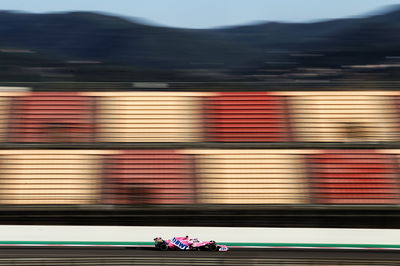
During a grand prix weekend and the subsequent build up and dismantling processes that takes place, observing social distancing measures would be nearly impossible. In the event of a crash for a driver, marshals and medical crew would need to be on hand at the scene of the accident. How can a two-metre social distancing policy be followed in this situation for example?
If plans to quarantine people arriving into countries from aboard for a two-week period - with countries nervous about setting off a second wave of infections - are adopted worldwide, that would also impact on F1’s travel plans.
In any scenario, another outbreak of coronavirus in the paddock would surely result in the entire travelling contingent entering a period of quarantine, which would subsequently jeopardise future events in the process.
MotoGP is considering adopting a closed paddock scenario that would see no one in or out of the paddock for the entire weekend, as well as travelling by road to European locations to help get around the quarantine problem, although it is unclear how uniform that approach would be around different countries.
One sensible solution to combat this dilemma is for F1 to finance testing kits to test personnel for coronavirus before they travelled to and from events. But during a time where NHS staff and other key workers are struggling to get tests due to a shortage in the UK and other countries, why would F1 be prioritised for such access just in the name of sport?
At the time of writing, there are over 3 million confirmed coronavirus cases and more than 200,000 deaths due to the virus globally. With hospitals under pressure from increased numbers of cases, there is an argument that it is irresponsible of F1 to go racing and risk enhancing the spread of coronavirus and adding to those numbers.
Only six weeks ago F1 was at the centre of a debacle following its decision to abandon the planned season-opening Australian Grand Prix, only after an outbreak of coronavirus in the Melbourne paddock.
The backlash at the decision to even attempt to go racing within the same timeframe that the outbreak was taking hold and countries such as Italy - home to Ferrari and AlphaTauri - had started to impose lockdowns was somewhat quelled by quick-fire postponements of races in Bahrain, Vietnam, and early European rounds in the Netherlands and Spain.
Drivers were unhappy about having to go to Australia, a stance underpinned by the outspoken nature of Lewis Hamilton’s “cash is king” comment. Despite being desperate to scratch their competitive itches as soon as possible, would they really go along with this and risk not only their own health but the health of others they come into contact with.
In many ways it is surprising that F1 is being so unwavering in its approach to potentially walk headlong into another Melbourne-esque fiasco but on the other hand a case can be argued for why it is doing so.
Championship officials are looking to be proactive during a vulnerable time for the sport and its competitors and have nothing to lose by continuing to work on rescheduling the calendar in the meantime.
It is admirable that F1 is pushing on with an optimistic agenda but are they managing our expectations in line with what is happening around the world?
It is too early to say what will happen for definite and much could change in the coming months.
While the situation may well improve to the point that F1 can meet its target, at present its plan looks incredibly far-fetched.
